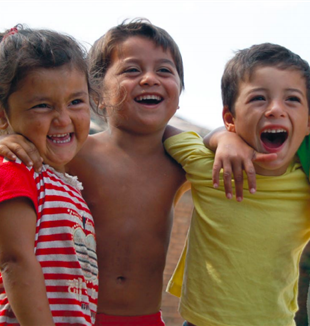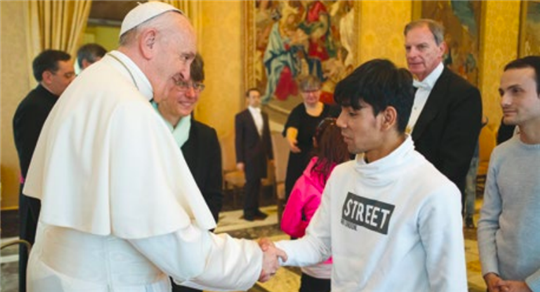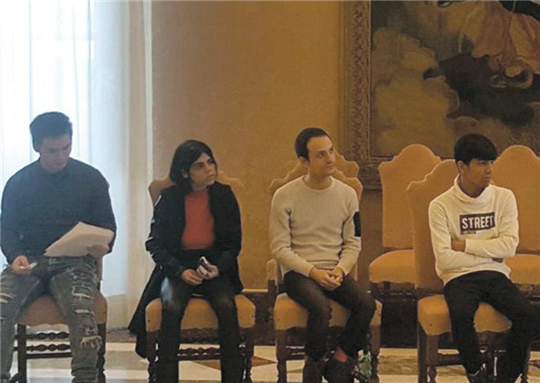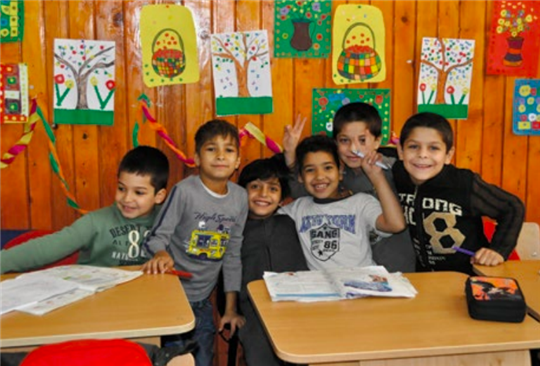
THE POPE AND THE ORPHANS OF BUCHAREST
Twenty years ago, members of the Romanian association FDP met children from an orphanage on the outskirts of Bucharest.Their friendship has continued to this day and even brought them to the Vatican. We offer their unpublished dialogue with Pope Francis.In August of 1998, in an orphanage on the outskirts of Bucharest, the volunteers of FDP–Protagonists in Education–found about 100 sick and neglected children. “They were left to sleep in small beds, because there was no incentive to take care of them. The nurses washed them from a distance by spraying them with pumped water. The children were excluded from school,” recounted Simona Carobene, director of FDP, a Romanian association created in 1996 through its members’ friendship with some volunteers from AVSI. FDP has since grown in the charism of Fr. Giussani, dedicating itself to people at risk of social exclusion.
From that meeting with the orphans 20 years ago, much more than a project was born. “We began a life together that continues to this day,” Simona states. Those small orphans have grown up to become mothers and fathers themselves; they work and have their own homes. On January 4, FSP and the orphans celebrated their friendship with a private audience with Pope Francis, as you can read in notes from the dialogue with him published in these pages.
“In these 20 years,” Simona continued, “they have taught us a great deal. They have always amazed us and continue to do so.” First of all, they are still alive, and want to live. “Not only are they marked by their abandonment in their mind and spirit, they are small and fragile. If you are not wanted, if you are abandoned, you do not grow in any dimension: psychological, cognitive, or physical. These orphans have seen other children die, and have always thought they would die in the same way, early and alone.”
Instead, between 2000 and 2002, the FDP opened three homes to host 21 of the orphans. Seven others were welcomed by foster families. In this way, 28 of the over 100 orphans were able to leave the orphanage. Today they themselves are parents: seven children have been born to date. “It seems like the most natural thing in the world, but in their case, it is extraordinary, not at all to be taken for granted,” starting from the fact that the young women chose not to have an abortion. In the midst of situations that continue to be difficult, “in these children of theirs it is so evident that life is a gift. They could very well not even have been born.”
Ironic attempts. In their letter asking for a private audience with the Pope, the friends of the association wrote, “These little ones force us to change every day. How should we accompany the new families? What can we say when a parent dies? Last year one of them, a four-year-old, saw his father die. How can we continue to accompany each other? What awaits us in the coming years?” They asked many other questions that have arisen from this friendship with the orphans, which over time has become a companionship encompassing all aspects of life, from the desire for work, for “a real job” (they have launched a nonprofit firm that produces mosaics) to the problem of a finding a home. It was difficult for these young people to even find rooms to rent in a market where the most fragile are exploited, and so the association acquired four apartments.
“All these efforts are ironic” concluded Simona, “because the wound of each person can never be truly healed. But even so, they already have everything, because they have been loved, one by one. Loved and looked upon with esteem, they have become protagonists in their own lives and have generated new ones. God has brought into full bloom something much greater than anything we could have imagined that August almost 20 years ago.”
The Dialogue with Francis
SIMONA CAROBENE. Dearest Holy Father, we are here today full of wonder and gratitude for these 20 years of friendship that have marked our lives forever. With us is a group of Romanian young people who have experienced the wounds of abandonment and sickness, together with some of their children– stupendous, happy children, who remind us in every moment that life is a gift. These children are the most beautiful gift that could have happened, an unexpected gift, above all because their parents told us that it would not be possible for them to be born, or even that it would be better to say “no” to these lives.
Instead, these children help us to remember that the life of each person is a very beautiful gift, even in circumstances that we would not have desired. Today we are here to celebrate the victory of our friends’ lives, lives that are from all outward appearances of little worth (at least this is what we were made to believe), but instead have generated and been a sign of beauty for the whole world, because God looks at them differently. He does not care if we are small, if we are disabled, if we have suffered greatly. He looks upon us and loves us just as we are.
We all need a mother. We all need a father. When these figures are not present, life is difficult and it seems that nobody can be trusted. Instead, when it happens that someone loves us, we begin to trust, and life becomes more beautiful. When we realize that someone looks at us with fondness for what we truly are, our life becomes more beautiful.
Like today, Holy Father! Being here is a fantastic gift for us! We are truly grateful to you! We want to be looked upon in this way forever for what we are, people of great worth, unique, full of desires and hopes, people who have struggled all our lives with courage, who still suffer greatly from the wounds of the past and the difficulties of the present, and also have many questions.
POPE FRANCIS. Dear young people, dear brothers and sisters, thank you for this meeting, and for the trust with which you bring me your questions, from which one perceives the reality of your life.
Before answering, I would like to thank the Lord with you because you are here, because He, with the collaboration of many friends, has helped you go forward and grow. Together we remember many children and young people who have gone to heaven. We pray for them and pray for those who live in situations of great difficulty in Romania and other countries of the world. We entrust to God and to the Virgin Mary all the boys and girls, the young men and young women, who suffer from sickness, wars, and slavery today.
And now I would like to answer your questions. In these questions there are many “whys.” Some of them I can answer, others I can’t: only God can answer them.
QUESTION. Why is life so difficult, and why do we often fight among ourselves? Why do we cheat each other? You priests tell us to go to church, but as soon as we leave we make mistakes and commit sins. So why did I go to church? If I consider God to be my friend, why is it important to go to church?
There is an answer to your “whys.” It is sin, human egotism. This is why– as you said–“we often fight among ourselves,” “we hurt each other,” “we cheat each other.” You yourself recognized it: even if we go to church we make mistakes again; we always remain sinners. So you rightly ask, what’s the use of going to church? It’s of use because it puts us in front of God, just as we are, to say “Here I am, Lord. I am a sinner, and I ask your forgiveness. Have mercy on me.” Jesus tells us that if we do this, we return home forgiven. In this way, slowly, slowly, God transforms our heart with His mercy, and also transforms our life. We do not always remain the same, but we are “worked” like clay in the potter’s hands, and the love of God takes the place of our egotism. This, my dear, is why it is important to go to church.
QUESTION. Why are there parents who love healthy children but don’t love the ones who are sick or have problems?
I would tell you this. In front of the fragility of others, like sickness, there are some adults who are weaker. They don’t have enough strength to bear the fragility because they themselves are fragile. If I have a big heavy stone, I can’t rest it on top of a cardboard box. There are parents who are fragile. They are men and women with their limits, their sins, and the fragility they carry inside. Maybe they didn’t have the good fortune to be helped when they were little. Do you agree?
QUESTION. Last year, one of our friends from the orphanage died. He died during Holy Week, on Holy Thursday. A priest told us that he died a sinner and so he won’t go to heaven. I don’t believe this.
What that priest told you seems very strange to me. It would be necessary to understand better. Maybe he wasn’t understood correctly. In any case, I tell you that God wants to bring us all to heaven, and that during Holy Week we celebrate precisely this: the Passion of Jesus, who like the Good Shepherd gave His life for us, His little sheep. If a little sheep is lost, He goes looking for it until He finds it, and when He finds it He puts it on His shoulders and brings it back home, full of joy. This is what the Lord does during Holy Week, also for your friend.
QUESTON. Why did we have this fate? Why? What meaning is there?
Your “why” is one of those that doesn’t have a human answer, only a divine one. I can’t say why you had “this fate.” We don’t know the “why” in the sense of the reason, but we know the “why” in the sense of the outcome that God wants to give to your fate. That outcome is healing, and life. Jesus says it in the Gospel when he meets a man born blind. The disciples ask Him, “Why is he this way? Who sinned, this man or his parents?” And Jesus answered, “No, neither he nor his parents sinned. It is so that the works of God might be made visible through him” (cf. Jn. 9:1-3). This means that the ugly situations we have found ourselves in, ever since we were little, God wants to heal, to restore; He wants to bring life where there is death. This is what Jesus does, and this is what Christians do too, those who are truly united with Christ. You have experienced this.
QUESTION. I often feel alone and I don’t know what meaning my life has. My daughter is in foster care and some people have judged that I’m not a good mother. Instead, I believe that my daughter is doing fine and that I decided correctly, also because we see each other often.
I agree with you that foster care can be a help in certain situations. The important point is that everything be done with love, with care for the person, with great respect. I understand that you often feel alone. I advise you not to close in on yourself, but to look for companionship in the Christian community. Jesus came to form a new family, His family, where nobody is alone and we are all brothers and sisters, children of Our Father in heaven and of the Mother Jesus gave us, the Virgin Mary. In the family of the Church we can gather together, healing our wounds and overcoming those empty spaces without love that sometimes exist in our human families.
QUESTION. When I was two months old, my mother abandoned me to an orphanage. When I was 21, I looked for and found my mother and lived with her for two weeks, but she treated me badly and so I left. My father is dead. What’s wrong with me, that she doesn’t want me? Why doesn’t she accept me?
It’s not a matter of something wrong with you. It’s a question of the great fragility of adults, due in your case to so much poverty, to so many social injustices that crush the small and the poor, and so much spiritual poverty. Yes, spiritual poverty hardens hearts and provokes what seems impossible, that a mother could abandon her own child. This is the fruit of material and spiritual poverty, of a wrong-headed, inhuman social system.
SIMONA. I was very struck by your message for the World Day of the Poor. It made my heart leap, and I asked myself, “How do I look at my kids?” At times I realize that I’m so involved in “doing” that I forget why Jesus brought us together. I still need to travel a road of conversion. This journey is ongoing and can never be taken for granted. This is why I continue to follow my kids, because they are my “saints.” And I remain deeply attached to Holy Mother Church through the charism of Fr. Giussani, which is the concrete modality that brought me to love Jesus. At the same time, however, the call of your message was very concrete. You talked about true sharing. I began to ask myself if the time had come to take one more step in my life, one of hospitality and sharing. It is a desire of the heart that is taking shape in me, and in the coming period I would like to verify it. What are the signs to look at in order to understand God’s design for me? What does it mean to live the vocation of poverty to the full?
FRANCIS. Simona, thank you for your testimony. Yes, our life is always a journey, a journey following the Lord Jesus, who with patient and faithful love never stops educating us, causing us to grow according to His design. Sometimes He surprises us, in order to break through our usual framework. Your desire to grow in sharing and evangelical poverty comes from the Holy Spirit, and He will help you go forward on this road, on which you and your friends have done so much good. You have helped the Lord to accomplish His works among these young people.
Thank you once again, all of you. Meeting you has done me a lot of good. I will carry you in my prayers, and I urge you, please pray for me too!